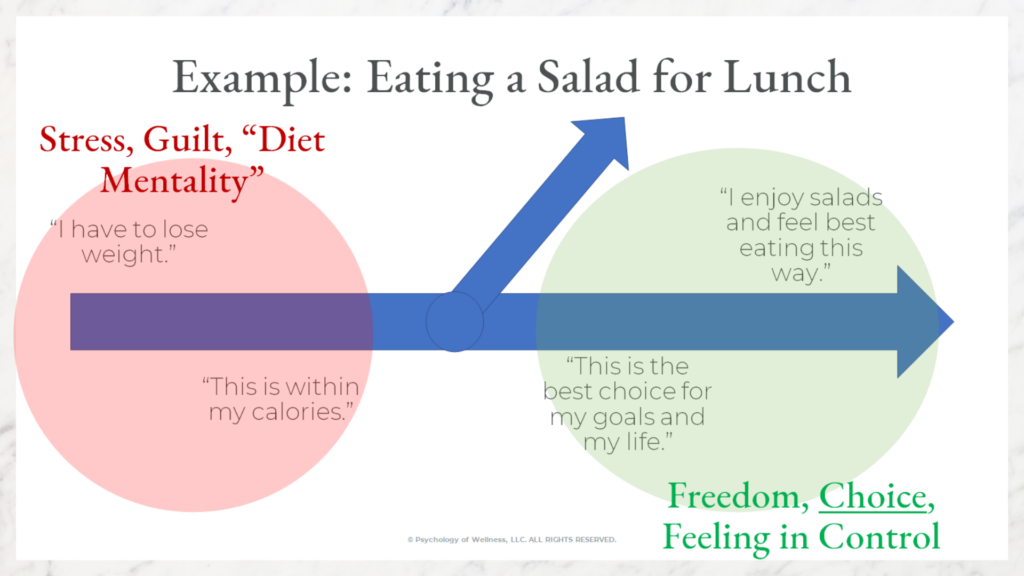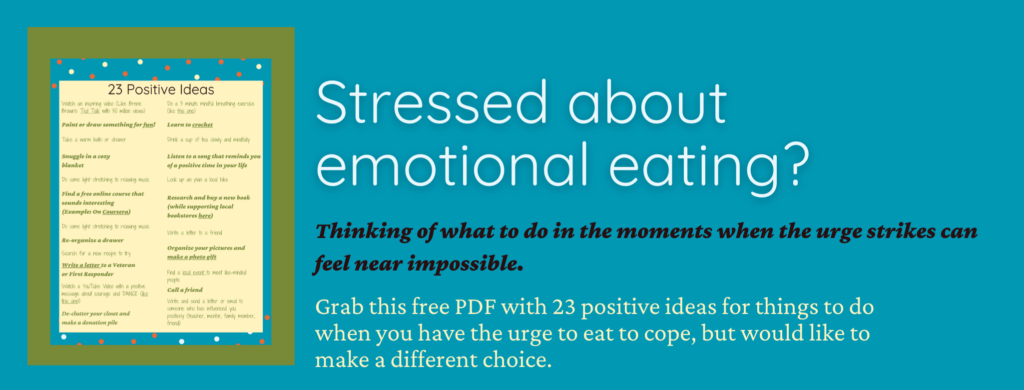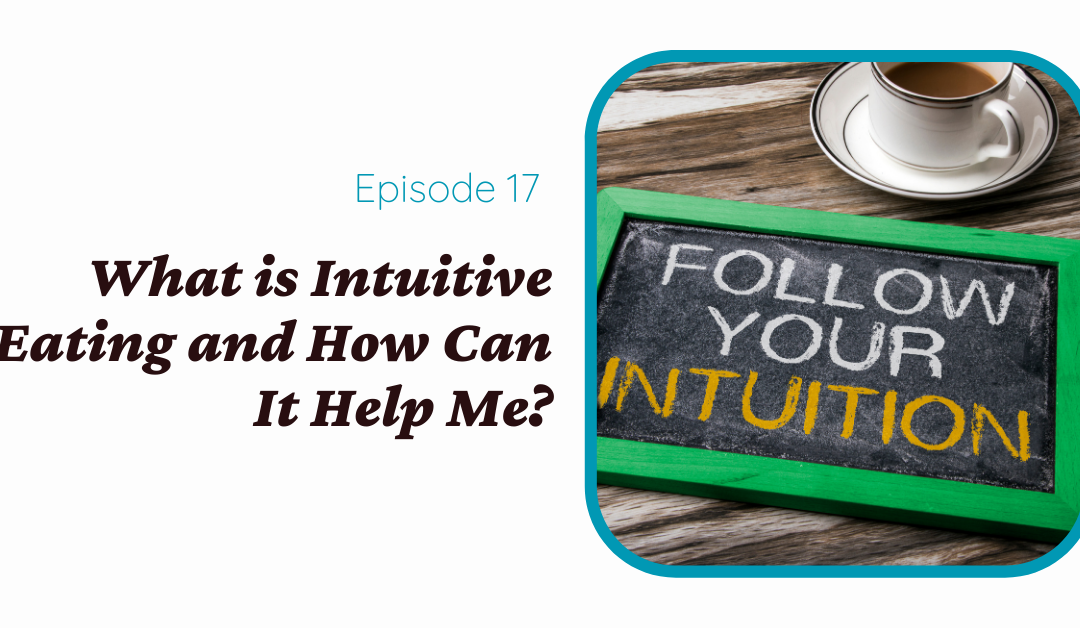Podcast: Play in new window | Download
Subscribe to The Innovative Therapist Podcast! Apple Podcasts | Spotify | RSS | More
Episode 17. We are talking all things Intuitive Eating today! What Intuitive Eating is, how it can help you, and how it relates to developing an autonomous and therefore sustainable relationship to food.
But first, did you grab my free guide yet? In the moments when you have a strong desire to eat to cope with emotions, it can feel almost impossible to do something else. I created this guide for those moments. It lists several different options for things to do instead of eating. It’s all about choice, increasing confidence, and therefore feelings of empowerment. Grab it for free here for quick and simple options right at your fingertips (with links, most 100% free) for those difficult moments.

What is Intuitive Eating?
You know people who stop eating after having half of their delicious dessert and put down their fork without effort?
I’m not talking about someone who actively limits themselves to 1/2 their key lime pie because they only have so many calories left for the day, but someone who allows themselves to have it without guilt and then makes the choice to stop solely because they are satisfied, not because they are worried about weight gain.
I’m talking about someone who truly has peace with their relationship with food.
The intuitive eater.
I used to incredibly be jealous of intuitive eaters and also in awe. I used to think to myself, “How on earth are they able to stop?”
After much internal work, practice, and re-connecting with my body, I now consider myself an intuitive eater. I also think that the concept of Intuitive Eating has a lot of wisdom that we can all learn from as we work to develop a healthier relationship with food.
The concept of Intuitive Eating has been around for some time and is extremely helpful for many people. The book Intuitive Eating was written by two dietitians Evelyn Tribole and Elyse Resch and is on it’s 4th edition. Despite this, relatively few people have heard of it and it is rarely discussed in the mainstream medical community (though this is changing to some extent).
My next three posts & episodes will focus on Intuitive Eating. In this 3-part series I will review:
Part 1. What Intuitive Eating is, how it relates to the Health at Every Size® movement, a summary of the research, and how it can be useful.
Part 2. Some of the reasons that Intuitive Eating and Health at Every Size® are not more widely adopted, including some alternate views and unanswered questions.
Part 3. Frequently Asked Questions I get about Intuitive Eating including: Will Intuitive Eating help me meet my goals?
Intuitive Eating Overview
“Intuitive Eating is a self-care eating framework, which integrates instinct, emotion, and rational thought and was created by two dietitians, Evelyn Tribole and Elyse Resch in 1995.”
– Taken from the Intuitive Eating website
It’s a personal and dynamic process, which includes 10 principles (Taken directly from the Intuitive Eating website):
- Reject the Diet Mentality: Throw out the diet books and magazine articles that offer you false hope of losing weight quickly, easily, and permanently. Get angry at the lies that have led you to feel as if you were a failure every time a new diet stopped working and you gained back all of the weight. If you allow even one small hope to linger that a new and better diet might be lurking around the corner, it will prevent you from being free to rediscover Intuitive Eating.
- Honor Your Hunger: Keep your body biologically fed with adequate energy and carbohydrates. Otherwise you can trigger a primal drive to overeat. Once you reach the moment of excessive hunger, all intentions of moderate, conscious eating are fleeting and irrelevant. Learning to honor this first biological signal sets the stage for re-building trust with yourself and food.
- Make Peace with Food: Call a truce, stop the food fight! Give yourself unconditional permission to eat. If you tell yourself that you can’t or shouldn’t have a particular food, it can lead to intense feelings of deprivation that build into uncontrollable cravings and, often, bingeing. When you finally “give-in” to your forbidden food, eating will be experienced with such intensity, it usually results in Last Supper overeating, and overwhelming guilt.
- Challenge the Food Police: Scream a loud “NO” to thoughts in your head that declare you’re “good” for eating minimal calories or “bad” because you ate a piece of chocolate cake. The Food Police monitor the unreasonable rules that dieting has created. The police station is housed deep in your psyche, and its loud speaker shouts negative barbs, hopeless phrases, and guilt-provoking indictments. Chasing the Food Police away is a critical step in returning to Intuitive Eating.
- Respect Your Fullness: Listen for the body signals that tell you that you are no longer hungry. Observe the signs that show that you’re comfortably full. Pause in the middle of a meal or food and ask yourself how the food tastes, and what is your current fullness level?
- Discover the Satisfaction Factor: The Japanese have the wisdom to promote pleasure as one of their goals of healthy living. In our fury to be thin and healthy, we often overlook one of the most basic gifts of existence–the pleasure and satisfaction that can be found in the eating experience. When you eat what you really want, in an environment that is inviting and conducive, the pleasure you derive will be a powerful force in helping you feel satisfied and content. By providing this experience for yourself, you will find that it takes much less food to decide you’ve had “enough”.
- Cope with Your Emotions with Kindness: First, recognize that food restriction, both physically and mentally, can, in and of itself, trigger loss of control, which can feel like emotional eating. Find kind ways to comfort, nurture, distract, and resolve your issues. Anxiety, loneliness, boredom, and anger are emotions we all experience throughout life. Each has its own trigger, and each has its own appeasement. Food won’t fix any of these feelings. It may comfort for the short term, distract from the pain, or even numb you. But food won’t solve the problem. If anything, eating for an emotional hunger may only make you feel worse in the long run. You’ll ultimately have to deal with the source of the emotion. (Language changed from last edition. Previous principle was “Honor Your Feelings without Using Food“).
- Respect Your Body: Accept your genetic blueprint. Just as a person with a shoe size of eight would not expect to realistically squeeze into a size six, it is equally futile (and uncomfortable) to have a similar expectation about body size. But mostly, respect your body so you can feel better about who you are. It’s hard to reject the diet mentality if you are unrealistic and overly critical of your body size or shape. All bodies deserve dignity. (Some language adaptations since the last edition).
- Movement – Feel the Difference: Forget militant exercise. Just get active and feel the difference. Shift your focus to how it feels to move your body, rather than the calorie burning effect of exercise. If you focus on how you feel from working out, such as energized, it can make the difference between rolling out of bed for a brisk morning walk or hitting the snooze alarm. If when you wake up, your only goal is to lose weight, it’s usually not a motivating factor in that moment of time. (Language changed since I last updated this post: From “Exercise” to “Movement”).
- Honor Your Health – Gentle Nutrition: Make food choices that honor your health and tastebuds while making you feel well. Remember that you don’t have to eat a perfect diet to be healthy. You will not suddenly get a nutrient deficiency or gain weight from one snack, one meal, or one day of eating. It’s what you eat consistently over time that matters, progress not perfection is what counts.
Relationship to the Health at Every Size® Movement
“Intuitive Eating is aligned with Health at Every Size® (HAES®), because the pursuit of intentional weight loss is a failed paradigm, which creates health problems: including weight stigma, weight cycling, and eating disorders.” (Intuitive Eating website)
Intuitive eating and HAES® proponents talk about the importance of abandoning efforts to intentionally restrict food intake for the purpose of weight loss, as this often keeps the cycle of dieting and weight cycling going, and impairs one’s ability to determine true hunger and satisfaction.
One of the major components, “unconditional permission to eat,” described in Principle 3, can be viewed as very counter to the mindset of someone focused on either dieting or weight loss.
What Do We Know about Intuitive Eating from Research?

Having an intuitive eating style has been associated with reduced emotional eating, less preoccupation with food, and a lower BMI, particularly in women (Augustus-Horvath & Tylka, 2011; Bruce and Ricciardelli, 2006; Gast, Madanat, & Nielson, 2012). It’s important to note, however, that association does not imply cause.
When non-dieting approaches were reviewed systematically (review included intuitive eating and Health at Every Size® interventions, among other non-dieting approaches like mindful eating), these interventions were found to be associated with:
- Reduced disordered eating and depression and,
- Increased self-esteem (Clifford et al., 2015)
When it comes to weight or other biological health outcomes, most studies found no significant weight loss with the non-diet approaches, although there were improvements in biological markers (e.g., improved hemoglobin A1c, lipid profile; Clifford et al., 2015). To be fair, this was typically seen in the “diet” comparison group as well, but given that weight regain is so common, it is possible that the improved biological outcomes with a non-diet approach would last longer if the weight is regained as it often is. As always, longer-term studies are needed.
In summary, at least over the time periods studied (up to 2 years in some studies; Bacon et al., 2005), it seems pretty clear that Intuitive Eating can positively impact psychological and health outcomes, although people who engage in Intuitive Eating have not been found to consistently lose weight. This is consistent with the Intuitive Eating/HAES® framework that intentional weight loss does not work long-term but that non-dieting approaches can improve our psychological and physical health.
What about Mindfulness and/or Mindful Eating?
My colleagues and I did a review of mindfulness-based interventions and found a similar result. Mindfulness-based interventions improved binge eating, emotional eating, but did not result in weight loss for most people, at least over the time periods studied (Katterman et al., 2014).
Given that much of intentional weight loss is regained, and that even just saying you are on diet to lose weight is associated with weight gain over time (Lowe et al., 2013), non-dieting approaches like Intuitive Eating and/or Heath at Every Size® offer an alternative approach that is more consistently associated with improved psychological and health outcomes over the long-term.
My next post will dive into some of these questions, and review some of the core components I find most helpful in moving towards a healthier relationship to food and your body.
So How Can Intuitive Eating Help Me?
If we have met, you probably know my deal about talking about autonomy. I believe that Intuitive Eating and mindful eating both help many people by helping them move away from shoulds, and move towards figuring out what works for them.
I often talk about the diet mentality and how that thinking pattern is by definition external motivation, which tends to be associated with fits and starts of motivation and short-term behavior change.
Autonomous motivation, which is associated with feelings of choice and possibly enjoyment, is associated with long-term change.
So essentially, my thought is that the holy grail of behavior change is moving towards autonomous control over our health behaviors (eating, exercise) and our bodies. And I think Intuitive Eating and/or mindful eating can be an excellent way to get there.

Is Intuitive Eating for Everyone?
I think I’ve made it abundantly clear that I think the Intuitive Eating principles and framework are incredibly useful. I use them in my program The Body Respect Program.
But to say it’s for everyone is a bit of a stretch. I think for health there is never a one size fits all solution, if nothing else because we are all individuals with different thoughts, beliefs, and preferences.
I think there are ways outside of the specific Intuitive Eating paradigm that can also move people towards an autonomous and therefore sustainable relationship with food. More on that next time.
Did you grab your freebie yet?
To increase feelings of competence that we can handle our emotions without food, we often need options. Grab my free PDF guide with 23 positive ideas for things to do in those moments when you are wanting to grab a snack but you really would feel best if you did something else.

In the meantime, I want to hear from you!
Do you think Intuitive Eating would be useful for you or people you care about? Why or why not? What upsides or downsides do you see? What excites you about it? What, if anything, concerns you? Comment below or send me a message!
Disclaimer: This blog and podcast is for informational and educational purposes only. It is not a substitute for individual professional advice or treatment, including medical or mental health advice. It does not constitute a provider patient relationship.
References
Augustus-Horvath, C. L., & Tylka, T. L. (2011). The acceptance model of intuitive eating. A comparison of women in emerging adulthood, early adulthood, and middle adulthood. Journal of Counseling Psychology, 58, 110–125.
Bacon, L., Stern, J., Van Loan, M., Keim, N. (2005). Size acceptance and intuitive eating improve health for obese, female chronic dieters. Journal of the American Dietetic Association, 7, 122–129.
Bruce, L., & Ricciardelli, L. (2006). A systematic review of the psychosocial correlates of intuitive eating among adult women. Appetite, 96, 454-472.
Clifford, D., Ozier, A., Bundros, J., Moore, J., Kreiser, A., Neyman-Morris, M. (2015). Impact of non-diet approaches on attitudes, behaviors, and health outcomes: A systematic review. Journal of Nutrition Education and Behavior, 47, 143-155.
Gast, J., Madanat, H., & Nielson, A. C. (2012). Are men more intuitive when it comes to eating and physical activity? American Journal of Men’s Health, 6, 164–171.
Katterman, S., Kleinman, B., Hood, M., Nackers, L., & Corsica, J. (2014). Mindfulness meditation as an intervention for binge eating, emotional eating, and weight loss: A systematic review. Eating Behaviors, 15, 197-204.
Lowe, M., Doshi, S., Katterman, S., & Feig, E. (2013). Dieting and restrained eating as prospective predictors of weight gain. Frontiers in Psychology.

testing
Food for thought 😄. I was not aware of intuitive eating but will stay tuned into your posts to learn more. Congrats!! and thank you for doing this.
Thanks so much for your comment, Barb! I appreciate your feedback and your readership and support! 🙂 Also, sorry for the delay. I’m clearly still learning about my blog platform as I only just saw this comment, oops! Live and learn 😉